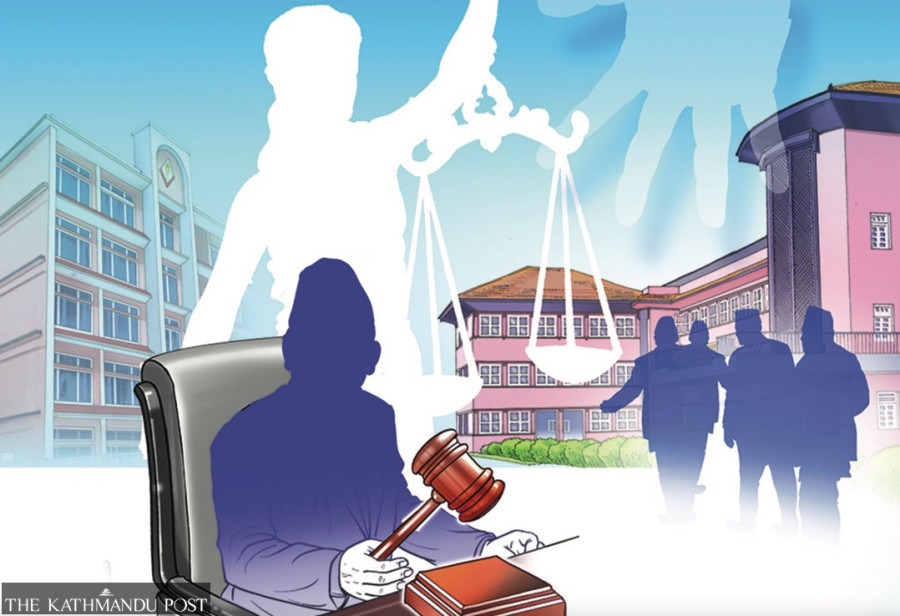Columns
Appoint Chief Justice right away
A delay in the appointment of the head of the top court casts doubt on the judiciary's independence.
Dipendra Jha
Nepal’s judiciary has been without a Chief Justice (CJ) for almost 15 months. Hari Krishna Karki, the senior-most justice of the Supreme Court, has been serving as acting CJ after another acting CJ, Deepak Kumar Karki, retired in October last year.
The delay in the appointment of the CJ has adversely impacted the judiciary’s role in the administration of justice, where more than 36,000 cases are yet to be adjudicated. Understandably, aspiring leaders among the Supreme Court (SC) justices might not want to adjudicate those cases where the government or the major parties, particularly the ruling parties and the main opposition, have high stakes. SC justices might hesitate to pass an order that could antagonise any side of the political parties. By nature, the government infringes upon people’s human rights, and often people file petitions against the government.
If the SC justices fail to deliver bold verdicts in cases where the government is a party, that would lead to a bizarre situation. Some crucial public interest litigations are sub-judice at the SC, including the writ petition challenging the presidential pocket veto against the Citizenship Bill and the petition against the Secretary-General of Parliament against his decision to give a clean chit to former CJ Cholendra Shumsher JB Rana. The public wants the top court to deliver its verdict immediately.
Acting CJs cannot work with high morale and implement their policies and vision confidently. Implementing the SC’s decisions and orders also remains challenging, especially when the SC remains headless for a prolonged period. It is also obvious that the top court cannot act effectively in fulfilling vacancies in other judicial positions.
The Judicial Council, which recommends high court judges, has failed to convene its meetings. Similarly, the Constitutional Council (CC), which recommends the CJ, has not held its meeting due to the government’s attempt to amend the Constitutional Council Act to allow the CC to nominate members in the constitutional bodies on the basis of majority. The Parliamentary Hearing Committee, which confirms the appointment of Justices of the SC, has not been formed yet. All these aspects show hurdles ahead for the independence of the judiciary.
We can draw important lessons from the Mahabharata, where Bhishma asks Dhritarastra why the announcement of the heir of Hastinapur is being delayed. When Shakuni interjects, Bhishma angrily says, “The meaning of politics is not the welfare of the son (Putra Kalyan) but the welfare of the people (Jana Kalyan).” Angry Bhishma stops Dhritarastra from announcing Duryodhan as the heir to the throne of Hastinapur, arguing that Dhritrastra himself had not been officially declared the king. But in Nepal, the CJ, who has not been confirmed, administered the oath of office and secrecy to the President, the highest public post holder of the country.
Justice Hari Krishna Karki recused from the House of Representatives (HoR) dissolution case, proving his neutrality in the case, yet he is deprived of an opportunity to serve as the confirmed CJ of the country.
Notably, Article 10 of the UN Convention on Basic Principles on the Independence of the Judiciary stipulates that persons selected for judicial office shall be individuals of integrity and ability with appropriate training or qualifications in law. Any method of judicial selection shall safeguard against judicial appointments for improper motives. If we look closely at this provision, we can conclude that there are improper motives behind the delay in the appointment or confirmation of the CJ. The government and the major political parties are delaying it mainly to suit their interests. Judges should not be put in a situation where they have to seek the mercy of the executive or other branches of the government to get promoted, or else they cannot act independently. A delay in the appointment of the CJ can lead to a situation where the executive could try to exert pressure on the justices to get favourable decisions on some key cases.
Prime Minister Pushpa Kamal Dahal wants the Truth and Reconciliation Bill under consideration of the House of Representatives to be passed soon because the SC has recently passed an order expressing dissatisfaction over the delay in transitional justice issues. Given its bitter relations with the Maoist Centre, the CPN-UML is unlikely to give what the prime minister wants on the TRC bill easily. This means the TRC bill might not be passed soon, and as the prime minister understands the UML’s game on the TRC bill, he has been saying that he wants to pass both the TRC and CC bills together.
The Dahal-led government has moved the CC bill in Parliament with the major objective of endorsing the CC decisions endorsed by three office bearers. When the then prime minister, KP Sharma Oli, brought an ordinance proposing similar provisions, the Maoist Centre and the Nepali Congress opposed it. The spirit of the constitution is that all the office bearers of the CC unanimously recommend nominees for constitutional bodies, which is not bad. The question, however, is that all the parties that lead the government want their upper hand in the nomination done by the CC, and this is at the root of the current feud between the major political parties. If the Maoist Centre had opposed Oli for diluting the majority in the CC, it is wrong for the Dahal-led government to try to amend the CC Act to make it easy for the CC to recommend nominees on the basis of a simple majority.
This political feud between the major parties should not have prevented the government from appointing or confirming the CJ. The legal fraternity knows well that Karki has always strictly followed the principles of justice in all the cases he has adjudicated as a Justice of the SC. Considering his background, CJ Karki recused himself from the HoR dissolution case, which should be appreciated. No political party should harbour ill will against the judiciary because judicial decisions are taken on the merits of the case.




 13.12°C Kathmandu
13.12°C Kathmandu















